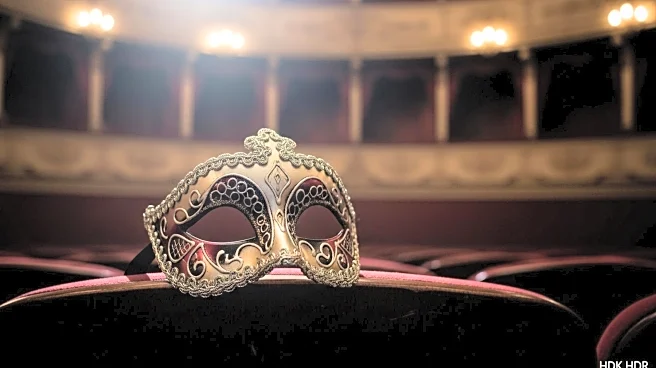What is the story about?
What's Happening?
'Masquerade,' a new interactive version of 'The Phantom of the Opera,' has debuted off-Broadway at a former art supply store on West 57th Street in New York City. The production, led by Andrew Lloyd Webber, Randy Weiner, and Diane Paulus, offers a unique analogue experience without digital screens, maintaining the traditional essence of the original musical. Audience members are guided through various rooms, including a rooftop setting, while dressed in formal attire and masks. The show features multiple casts performing different roles, creating an intimate yet complex narrative experience. The production emphasizes the emotional and psychological aspects of the story, exploring the Phantom's backstory and trauma.
Why It's Important?
The 'Masquerade' production signifies a departure from conventional theater presentations, embracing interactive and immersive storytelling. This approach could redefine audience engagement, encouraging more productions to adopt similar formats. The show's success may influence the economic dynamics of off-Broadway theater, attracting diverse audiences and boosting local businesses. Additionally, the production's analogue nature challenges the trend of digital immersion, highlighting the value of traditional theatrical techniques in creating impactful experiences.
What's Next?
As 'Masquerade' continues its run, it may attract further attention from theater enthusiasts and critics, potentially leading to extended performances or adaptations in other locations. The creative team might refine the experience based on audience feedback, exploring additional immersive elements. The production's success could inspire other theater companies to invest in similar interactive formats, expanding the possibilities for storytelling in live performances.
Beyond the Headlines
The immersive format of 'Masquerade' raises questions about the future of theater and the role of audience participation in storytelling. By involving the audience directly, the production challenges traditional boundaries between performers and spectators, potentially leading to ethical considerations regarding audience consent and engagement. The show's analogue approach also emphasizes the importance of physical presence and interaction in live performances, highlighting the evolving relationship between technology and theater.















